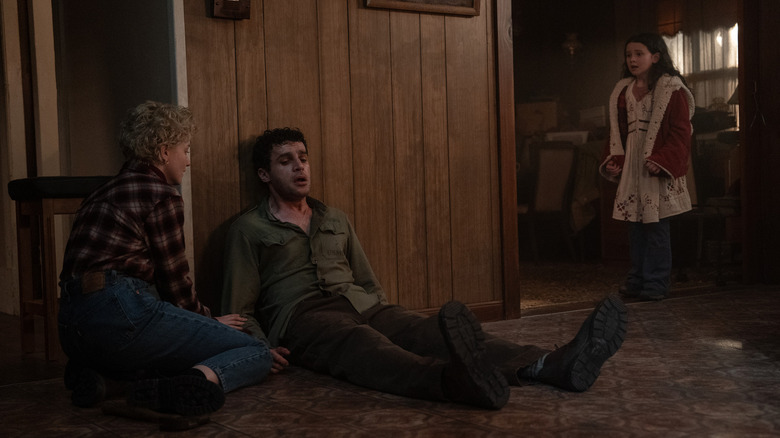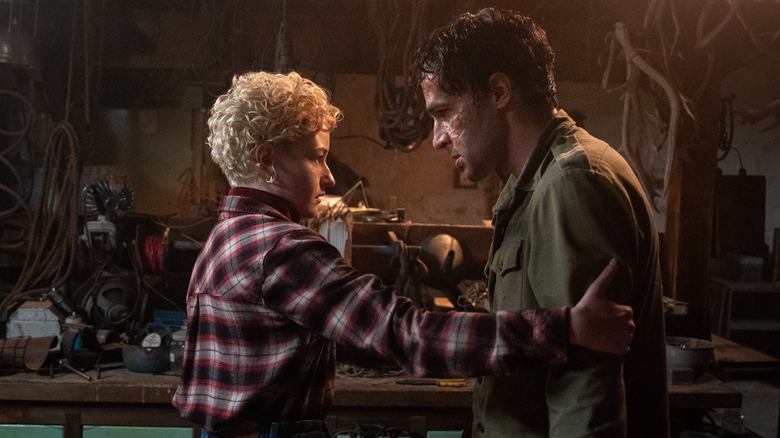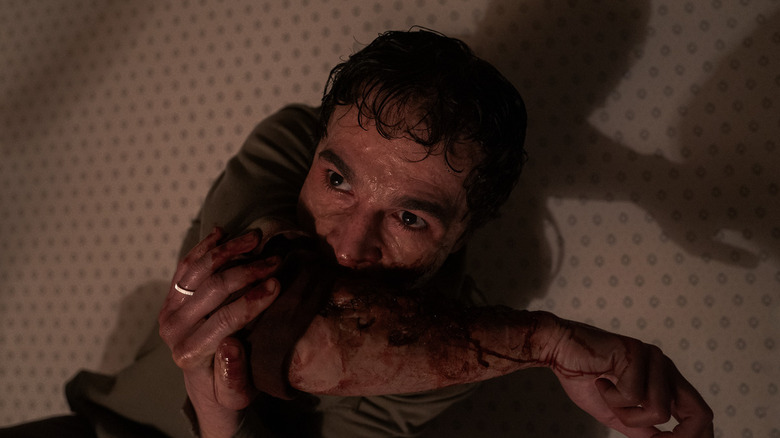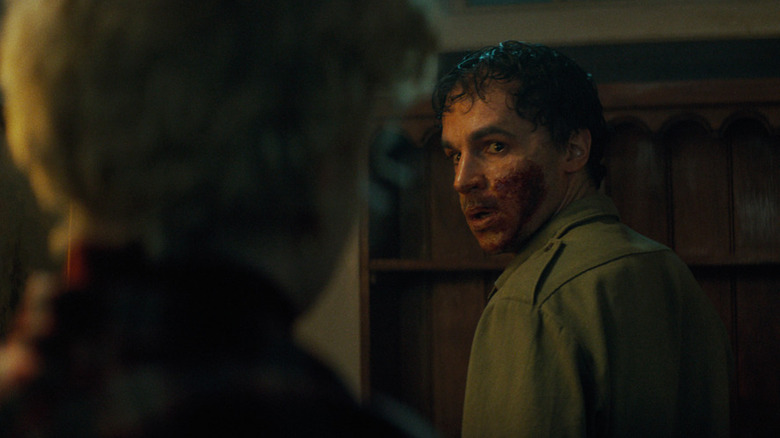This text incorporates spoilers for “Wolf Man.”
Getting old is the last word physique horror, as it is the lengthy, gradual highway towards dying that each dwelling factor should expertise, bar none. This course of, as with most physique horror, is primarily expressed bodily. In spite of everything, most individuals will say that they are mentally as younger as they ever had been, whereas they’re observing how their physique is having points performing the way in which that it used to; it is extremely frequent to see a social media put up by a 30-something individual lamenting their newfound again points or some such ailment. An individual’s notion of time passing might make it seem to be the years have passed by in a flash, however the gradual technique of getting older permits most individuals to make the bodily transition simpler, because it occurs almost imperceptibly.
But that notion is drastically challenged when one thing happens to alter our establishment. In my very own expertise, I used to roll my eyes at these social media posts about folks experiencing the onset of varied aches and pains, erroneously believing I hadn’t skilled such issues. The reality was, I’ve, and nonetheless do — my power well being points (together with however not restricted to a liver transplant) modified the way in which I see and work together with the world from an unusually younger age. I can now not relate to such “relatable” content material as a result of I now not see the identical world most individuals do.
Leigh Whannell’s “Wolf Man” is a film suffused with themes of body horror, illness, transformation, perception, and, ultimately, death, telling the story of poor Blake Lovell (Christopher Abbott) turning into contaminated with a “hills fever” which can or will not be supernatural. Blake’s ordeal is condensed into one lengthy, harrowing night time, throughout which his spouse Charlotte (Julia Garner) and daughter Ginger (Matilda Firth) helplessly watch him rework into an inhuman creature. Whereas the movie incorporates a lot of the prerequisite parts of a physique horror transformation horror film, it does one factor that no different physique horror film, not to mention a werewolf film, has tried on the identical scale earlier than: it exhibits us what it is like for Blake to bear this alteration mentally and emotionally in addition to bodily. This angle isn’t solely half and parcel of Whannell’s pursuits as a filmmaker, but it surely makes “Wolf Man” a uniquely terrifying and tragic expertise.
Charlotte and Ginger cease making sense to Blake
For the October 4, 1985 episode of “The Twilight Zone” revival sequence, Wes Craven directed a section entitled “Wordplay,” written by Rockne S. O’Bannon. In it, a mean salesman inexplicably begins listening to odd phrases rather than others, and shortly sufficient everybody round him has begun to talk a totally totally different language. The story is a improbable metaphor for the sensation of being out of section with everybody round you and emphasizes the isolating horror of being unable to know or be understood. The section closes with some hope for the character, making the story a parable for individuals who should study to reside with some type of incapacity.
“Wolf Man” takes this idea additional into horrific territory, displaying that the an infection Blake suffers from ensures that there can be no coping or studying mechanism to permit him to proceed to co-exist with people. Because the illness remakes Blake’s physique, enhancing a few of his senses like his sight and listening to, his capability to talk disappears. On the similar time, he is now not capable of perceive his spouse and daughter, main to fret and frustration on each side. A part of the issue is that Blake, Charlotte, and Ginger had been already having communication points even earlier than Blake received scratched by a werewolf, with Whannell and co-writer Corbett Tuck utilizing the couple’s marital issues and their separate points with elevating their daughter as proof for the way tenuous our capability to speak with different folks is even when all our colleges can be found to us. The tragic grace observe relating to this theme comes when Blake, who was once a author, makes one final try to speak together with his spouse by writing on a pad of paper. He writes “dying,” making an attempt to explain his present state, and Charlotte refutes this (for his sake in addition to her personal denial), reassuring him he is simply sick. Even when phrases are nonetheless out there to them, the couple cannot come collectively.
Wolf Man applies some sci-fi to supernatural horror
George Waggner and Curt Siodmak’s “The Wolf Man,” which Whannell’s movie is called after and impressed by, absolutely established the werewolf as a tragic determine, following Stuart Walker’s “Werewolf of London” made six years earlier. This tone comes from the truth that the werewolf is a cursed determine, a being pressured to both reside a twin life or have a twin character, relying on the interpretation. All through the many werewolf films made after these first two Common Photos entries (to say nothing of TV exhibits, books, and different media), artists have usually given the werewolf some minor respite from their plight. This normally happens within the type of some sort of euphoria after their transformation and will be seen in movies as numerous as “An American Werewolf in London,” “The Howling,” “Wolf,” and “Ginger Snaps” (the latter additionally being a movie a couple of gradual, everlasting transformation somewhat than a magical, back-and-forth one). Even David Cronenberg’s remake of “The Fly,” the movie which hews closest to the model of physique horror in “Wolf Man,” sees its titular creature get pleasure from a interval of virility earlier than his degeneration.
In distinction, Whannell’s “Wolf Man” is not granted any such perks. As a substitute, the movie commits virtually completely to its conception of the werewolf curse as a pure illness, following within the footsteps of “The Fly.” But it even goes a bit additional into sci-fi territory than that film did, no less than in the way in which it depicts Blake as turning into one thing absolutely non-human somewhat than a hybrid of human and animal. In the way in which Blake regularly finds himself separated from the human world round him in each manner doable, his transformation is not simply akin to Larry Talbot or Seth Brundle however can also be analogous to astronaut Dave Bowman (from “2001: A Area Odyssey”) and Lucy (from “Lucy”), characters who’ve their humanity and identification damaged down completely sufficient so as absolutely turn out to be a completely new being. The place such transformations in sci-fi movies like these will be seen as extra transcendent than tragic, Whannell applies the idea to a horror lens, emphasizing how such whole lack of one’s humanity could possibly be as scary as it’s releasing.
Wolf Man incorporates a twin transformation
All of Leigh Whannell’s movies, whether or not as a screenwriter or a director, concern the theme of notion. That is usually as a result of the truth that most of Whannell’s scripts contain a story twist, and these twists are typically about issues {that a} protagonist (and, thus, the viewers) is both seeing or not seeing till it is too late. The twist in “Wolf Man” is not narrative, however structural. Whannell presents dueling views — the world outdoors of Blake versus the one inside — which, in impact, permits for a twin transformation to happen. Blake, in the true world, is reworking right into a wolf creature earlier than Charlotte and Ginger’s eyes, whereas Charlotte and Ginger are reworking into some form of wraith-like demons in Blake’s eyes.
This angle shift, particularly when added to the communication breakdown Blake suffers from, absolutely articulates what it is likely to be prefer to expertise reworking right into a werewolf. It is not that Blake begins to have the ideas and instincts of an animal, however somewhat that his human character is so fully modified by the distorted data that his senses are feeding him. Like an individual caught in Jigsaw’s entice from “Noticed,” like somebody stranded within the Farther from “Insidious,” or like somebody on the mercy of an abuser (whether or not it is an AI program like STEM in “Improve” or a vicious and highly effective ex in “The Invisible Man”), Blake’s actuality is being dictated to him by the werewolf illness.
Along with this angle shift amping up the fear and tragedy of the werewolf character, it additionally absolutely realizes the dissonance inherent within the Wolf Man character. He, or she, or it, is a being caught between two worlds whereas belonging to neither, a Lovecraftian Factor That Ought to Not Be, to borrow a music title from Metallica. It is easy to pity, and even chuckle at, the werewolf, everlasting schmuck of horror cinema. It is rather less simple when you notice that all of us undergo our personal irreversible, cursed transformation, in the end. As Whannell’s movie says, dying occurs to everyone; the trick is in the way you reply to that change.
“Wolf Man” is in theaters in all places.
This text incorporates spoilers for “Wolf Man.”
Getting old is the last word physique horror, as it is the lengthy, gradual highway towards dying that each dwelling factor should expertise, bar none. This course of, as with most physique horror, is primarily expressed bodily. In spite of everything, most individuals will say that they are mentally as younger as they ever had been, whereas they’re observing how their physique is having points performing the way in which that it used to; it is extremely frequent to see a social media put up by a 30-something individual lamenting their newfound again points or some such ailment. An individual’s notion of time passing might make it seem to be the years have passed by in a flash, however the gradual technique of getting older permits most individuals to make the bodily transition simpler, because it occurs almost imperceptibly.
But that notion is drastically challenged when one thing happens to alter our establishment. In my very own expertise, I used to roll my eyes at these social media posts about folks experiencing the onset of varied aches and pains, erroneously believing I hadn’t skilled such issues. The reality was, I’ve, and nonetheless do — my power well being points (together with however not restricted to a liver transplant) modified the way in which I see and work together with the world from an unusually younger age. I can now not relate to such “relatable” content material as a result of I now not see the identical world most individuals do.
Leigh Whannell’s “Wolf Man” is a film suffused with themes of body horror, illness, transformation, perception, and, ultimately, death, telling the story of poor Blake Lovell (Christopher Abbott) turning into contaminated with a “hills fever” which can or will not be supernatural. Blake’s ordeal is condensed into one lengthy, harrowing night time, throughout which his spouse Charlotte (Julia Garner) and daughter Ginger (Matilda Firth) helplessly watch him rework into an inhuman creature. Whereas the movie incorporates a lot of the prerequisite parts of a physique horror transformation horror film, it does one factor that no different physique horror film, not to mention a werewolf film, has tried on the identical scale earlier than: it exhibits us what it is like for Blake to bear this alteration mentally and emotionally in addition to bodily. This angle isn’t solely half and parcel of Whannell’s pursuits as a filmmaker, but it surely makes “Wolf Man” a uniquely terrifying and tragic expertise.
Charlotte and Ginger cease making sense to Blake
For the October 4, 1985 episode of “The Twilight Zone” revival sequence, Wes Craven directed a section entitled “Wordplay,” written by Rockne S. O’Bannon. In it, a mean salesman inexplicably begins listening to odd phrases rather than others, and shortly sufficient everybody round him has begun to talk a totally totally different language. The story is a improbable metaphor for the sensation of being out of section with everybody round you and emphasizes the isolating horror of being unable to know or be understood. The section closes with some hope for the character, making the story a parable for individuals who should study to reside with some type of incapacity.
“Wolf Man” takes this idea additional into horrific territory, displaying that the an infection Blake suffers from ensures that there can be no coping or studying mechanism to permit him to proceed to co-exist with people. Because the illness remakes Blake’s physique, enhancing a few of his senses like his sight and listening to, his capability to talk disappears. On the similar time, he is now not capable of perceive his spouse and daughter, main to fret and frustration on each side. A part of the issue is that Blake, Charlotte, and Ginger had been already having communication points even earlier than Blake received scratched by a werewolf, with Whannell and co-writer Corbett Tuck utilizing the couple’s marital issues and their separate points with elevating their daughter as proof for the way tenuous our capability to speak with different folks is even when all our colleges can be found to us. The tragic grace observe relating to this theme comes when Blake, who was once a author, makes one final try to speak together with his spouse by writing on a pad of paper. He writes “dying,” making an attempt to explain his present state, and Charlotte refutes this (for his sake in addition to her personal denial), reassuring him he is simply sick. Even when phrases are nonetheless out there to them, the couple cannot come collectively.
Wolf Man applies some sci-fi to supernatural horror
George Waggner and Curt Siodmak’s “The Wolf Man,” which Whannell’s movie is called after and impressed by, absolutely established the werewolf as a tragic determine, following Stuart Walker’s “Werewolf of London” made six years earlier. This tone comes from the truth that the werewolf is a cursed determine, a being pressured to both reside a twin life or have a twin character, relying on the interpretation. All through the many werewolf films made after these first two Common Photos entries (to say nothing of TV exhibits, books, and different media), artists have usually given the werewolf some minor respite from their plight. This normally happens within the type of some sort of euphoria after their transformation and will be seen in movies as numerous as “An American Werewolf in London,” “The Howling,” “Wolf,” and “Ginger Snaps” (the latter additionally being a movie a couple of gradual, everlasting transformation somewhat than a magical, back-and-forth one). Even David Cronenberg’s remake of “The Fly,” the movie which hews closest to the model of physique horror in “Wolf Man,” sees its titular creature get pleasure from a interval of virility earlier than his degeneration.
In distinction, Whannell’s “Wolf Man” is not granted any such perks. As a substitute, the movie commits virtually completely to its conception of the werewolf curse as a pure illness, following within the footsteps of “The Fly.” But it even goes a bit additional into sci-fi territory than that film did, no less than in the way in which it depicts Blake as turning into one thing absolutely non-human somewhat than a hybrid of human and animal. In the way in which Blake regularly finds himself separated from the human world round him in each manner doable, his transformation is not simply akin to Larry Talbot or Seth Brundle however can also be analogous to astronaut Dave Bowman (from “2001: A Area Odyssey”) and Lucy (from “Lucy”), characters who’ve their humanity and identification damaged down completely sufficient so as absolutely turn out to be a completely new being. The place such transformations in sci-fi movies like these will be seen as extra transcendent than tragic, Whannell applies the idea to a horror lens, emphasizing how such whole lack of one’s humanity could possibly be as scary as it’s releasing.
Wolf Man incorporates a twin transformation
All of Leigh Whannell’s movies, whether or not as a screenwriter or a director, concern the theme of notion. That is usually as a result of the truth that most of Whannell’s scripts contain a story twist, and these twists are typically about issues {that a} protagonist (and, thus, the viewers) is both seeing or not seeing till it is too late. The twist in “Wolf Man” is not narrative, however structural. Whannell presents dueling views — the world outdoors of Blake versus the one inside — which, in impact, permits for a twin transformation to happen. Blake, in the true world, is reworking right into a wolf creature earlier than Charlotte and Ginger’s eyes, whereas Charlotte and Ginger are reworking into some form of wraith-like demons in Blake’s eyes.
This angle shift, particularly when added to the communication breakdown Blake suffers from, absolutely articulates what it is likely to be prefer to expertise reworking right into a werewolf. It is not that Blake begins to have the ideas and instincts of an animal, however somewhat that his human character is so fully modified by the distorted data that his senses are feeding him. Like an individual caught in Jigsaw’s entice from “Noticed,” like somebody stranded within the Farther from “Insidious,” or like somebody on the mercy of an abuser (whether or not it is an AI program like STEM in “Improve” or a vicious and highly effective ex in “The Invisible Man”), Blake’s actuality is being dictated to him by the werewolf illness.
Along with this angle shift amping up the fear and tragedy of the werewolf character, it additionally absolutely realizes the dissonance inherent within the Wolf Man character. He, or she, or it, is a being caught between two worlds whereas belonging to neither, a Lovecraftian Factor That Ought to Not Be, to borrow a music title from Metallica. It is easy to pity, and even chuckle at, the werewolf, everlasting schmuck of horror cinema. It is rather less simple when you notice that all of us undergo our personal irreversible, cursed transformation, in the end. As Whannell’s movie says, dying occurs to everyone; the trick is in the way you reply to that change.
“Wolf Man” is in theaters in all places.























